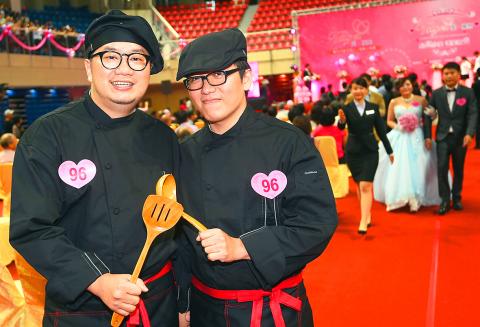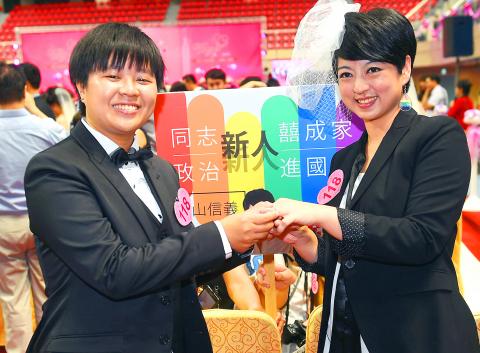The month of October is “pride month” for the lesbian, gay, bisexual and transgender (LGBT) community in Taiwan, as tens of thousands are expected to turn up at the Taiwan LGBT Pride parade (台灣同志遊行) scheduled for Saturday in Taipei.
The LGBT community can also take pride in the Taipei City Government’s increased recognition of their rights. For the first time, same-sex couples participated in a public mass wedding, usually held twice-yearly, following a push by the LGBT community and some Taipei City councilors such as the Chinese Nationalist Party’s (KMT) Councilor Wang Hong-wei (王鴻薇).
“Every love deserves to be cherished,” said Taipei City Mayor Ko Wen-je (柯文哲), who served as the ceremony’s presiding witness.

Photo courtesy of Chang Chia-ming
According to the Chinese-language media, 123 couples — including 10 same-sex partners — were married at the event, which was held at the University of Taipei.
When introducing the measure last month, Taipei City Deputy Mayor Chou Li-fang (周麗芳) said that LGBT rights are a human rights issue.
“We hope that all Taipei citizens can enjoy the same blessings from the Taipei City Government,” Chou said.

Photo courtesy of Chang Chia-ming
Although the ceremony is not legally binding, Chou called it a big step forward.
IT’S NOT LEGAL
Gay activist Nelson Chen (陳敬學), who held a public wedding with his boyfriend Kao Chih-wei (高治瑋) in 2006, was one of yesterday’s participants. Chen said that although he was grateful that same-sex couples were given recognition, there is still a long way to go.
“My partner and I have been married for almost 10 years, but the government still refuses to legally recognize our marriage,” Chen said. “The public mass wedding is more like a ceremonial blessing than equal treatment.”
Chen added that the government should pass an anti-discrimination act and a human rights protection basic law so as to safeguard everyone’s basic rights.
“Even the US, which is a predominately Christian, ruled in favor of marriage equality. Taiwan’s LGBT community should bravely fight for their own rights,” Chen said.
THE ‘NOT MY TAXES’ CHESTNUT
Not everyone was elated, though. The Happiness of the Next Generation Alliance (下一代幸福聯盟) was among a handful of Christian groups that condemned the admittance of same-sex couples to the ceremony.
Predictably, the alliance called on “taxpayers” to phone the 1999 Citizen Hotline and protest the government’s measure.
“We are strongly opposed to the city’s promotion of gay culture with ‘our money’ without any discussion,” the alliance wrote in an open letter.
Don’t LGBTs also pay taxes and fulfill the same obligations and responsibilities in society? Isn’t the LGBT community entitled to equal treatment?
Of the nation’s six municipalities, Taipei, Taoyuan, Taichung and Kaohsiung have promised to include same-sex couples in their public mass weddings, while New Taipei Mayor Eric Chu (朱立倫) and Tainan Mayor William Lai (賴清德) refused to adopt the measure, claiming that it is inappropriate to do so before amendments to the Civil Code (民法) are completed.
Their reasoning sounds lame.
Chu serves concurrently as the KMT’s chairman and presidential candidate, and Lai is an upcoming political star in the Democratic Progressive Party (DPP) who may run for president in the future. As potential leaders of the nation, it is encumbant upon them to take a stand on marriage equality.
As we congratulate the 10 same-sex couples who made history yesterday — as well as the other 113 who deserve equal recognition — it is hoped that these symbolic ceremonies will soon transform into meaningful rights for the LGBT community throughout the nation.

April 14 to April 20 In March 1947, Sising Katadrepan urged the government to drop the “high mountain people” (高山族) designation for Indigenous Taiwanese and refer to them as “Taiwan people” (台灣族). He considered the term derogatory, arguing that it made them sound like animals. The Taiwan Provincial Government agreed to stop using the term, stating that Indigenous Taiwanese suffered all sorts of discrimination and oppression under the Japanese and were forced to live in the mountains as outsiders to society. Now, under the new regime, they would be seen as equals, thus they should be henceforth

Last week, the the National Immigration Agency (NIA) told the legislature that more than 10,000 naturalized Taiwanese citizens from the People’s Republic of China (PRC) risked having their citizenship revoked if they failed to provide proof that they had renounced their Chinese household registration within the next three months. Renunciation is required under the Act Governing Relations Between the People of the Taiwan Area and the Mainland Area (臺灣地區與大陸地區人民關係條例), as amended in 2004, though it was only a legal requirement after 2000. Prior to that, it had been only an administrative requirement since the Nationality Act (國籍法) was established in

With over 80 works on display, this is Louise Bourgeois’ first solo show in Taiwan. Visitors are invited to traverse her world of love and hate, vengeance and acceptance, trauma and reconciliation. Dominating the entrance, the nine-foot-tall Crouching Spider (2003) greets visitors. The creature looms behind the glass facade, symbolic protector and gatekeeper to the intimate journey ahead. Bourgeois, best known for her giant spider sculptures, is one of the most influential artist of the twentieth century. Blending vulnerability and defiance through themes of sexuality, trauma and identity, her work reshaped the landscape of contemporary art with fearless honesty. “People are influenced by

The remains of this Japanese-era trail designed to protect the camphor industry make for a scenic day-hike, a fascinating overnight hike or a challenging multi-day adventure Maolin District (茂林) in Kaohsiung is well known for beautiful roadside scenery, waterfalls, the annual butterfly migration and indigenous culture. A lesser known but worthwhile destination here lies along the very top of the valley: the Liugui Security Path (六龜警備道). This relic of the Japanese era once isolated the Maolin valley from the outside world but now serves to draw tourists in. The path originally ran for about 50km, but not all of this trail is still easily walkable. The nicest section for a simple day hike is the heavily trafficked southern section above Maolin and Wanshan (萬山) villages. Remains of